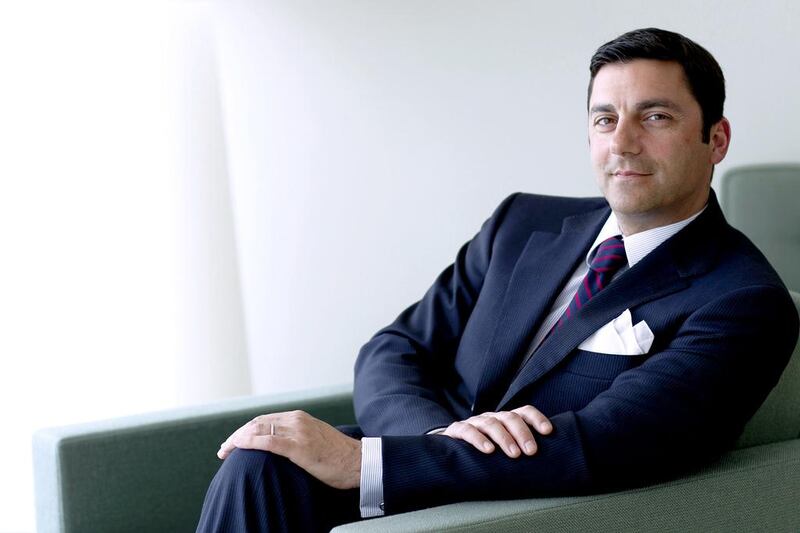The Swiss banking industry is going through a period of transition, and Francesco Genovese, head of the Middle East asset management business of 210-year-old Pictet, is well aware of it.
“There has been some permanent change in the industry. Above all, clients now want to be reassured that their assets are secure,” says the urbane executive, who has been running the business in the region since 2007, when it opened a permanent office in Dubai.
Under pressure from the regulatory process in Europe and the United States, the Swiss banks have been extending their world view beyond the shores of Lake Geneva and the spires of Zurich. The UAE is one of the places that, Mr Genovese says, appreciates the traditional strengths of the Swiss industry: expertise and discretion.
“Our big clients, individual and institutional, come to us because we have the know-how and we have the stability. They see us as an anchor of stability. We are not an investment bank, we are a wealth preserver,” he says.
One of Pictet’s big selling points in the Middle East is its family nature. “The ninth generation of Pictet family members is running the bank, so we understand a lot about wealth transmission. In its entire history, there have only been 40 partners.
“It is a real family firm: the average tenure of an employee is 15 years. We have had a profit- sharing scheme with employees since 1921,” Mr Genovese says, underlining the traditional values that Arabian Gulf business families and institutions value.
But in an era when some of the big Swiss banks have been tainted by allegations of helping clients evade taxes and even money laundering, he is also keen to stress Pictet’s “clean” image within the industry.
“Pictet never had any ‘toxic’ issues like some of the banks in the past five years, and never had any scandals like some of the hedge funds. We do not accept clients who are purely looking to evade tax, or avoid proper disclosure. We have turned down big business because it would have put our reputation at risk,” he says.
Pictet also managed to escape the reputational blows that many global banks have suffered recently. Even during the financial crisis, our executives took a 10 per cent pay cut but we avoided redundancies. Clients like that, and also the fact we are privately owned, and not listed. It means we are flexible enough and fast enough to adapt to a changing environment,” Mr Genovese adds.
The Geneva headquarters of the bank has cooperated with American authorities in their wider examination of the industry, and it believes any further sanctions from the US on other banks of the Swiss industry will have no significant effect on its operations.
Mr Genovese’s growing business in the UAE came about as a direct result of the need to diversify from the traditional Euro-centric heartland of Swiss banking. “A big asset management business was not originally our goal, more it was a consequence of our success in attracting clients to the bank,” he says.
His clients in the region are exclusively institutional – the big investing institutions, sovereign wealth funds (SWFs), family offices and pension funds that dominate financial life. The shift in global financial firepower has made the Middle East as irresistible for Pictet as for other European asset managers.
Mr Genovese estimates that 85 per cent of the global institutional investable assets in the world originate in the Middle East and Asia, and that about half of that comes from the Arabian Gulf region. “There is a long history of SWFs in the region, beginning with Kuwait in the 1950s and Abu Dhabi and Saudi in the 1970s. It’s inevitable that these reserves will attract the attention of asset managers like us,” he believes.
Pictet’s investment policy for its US$438 billion of total assets under management is guided by a set of standards drawn up by its partners, who are allowed to, even expected to, invest alongside clients’ funds.
Mr Genovese explains that an advisory board of investment experts has helped the bank draw up a list of “global mega themes” – big investment propositions such as water, energy and security, as well as a category of “premium brands” such as Apple and Nike.
After that, some fairly simple investment guidelines apply: “We like liquidity. We have to be able to sell 90 per cent of an investment within three weeks without moving the market more than 5 per cent,” he says. “We believe in wealth preservation, liquidity and performance. Those are our three guiding principles.”
His global investment view is also fairly focused. “We don’t invest in real estate at all. We are very selective about European equities, but really favour long-term equity products in emerging markets, and bond markets in hard and local currencies.
“The US is not an important focus for us. We do not have the scale, and in an era of low interest rates you have to take a bit more risk. One product we have developed is ARFI – absolute return fixed income – which gives protection for the downside.”
Asset management is a hot topic in the UAE. The Dubai International Financial Centre has put it at the centre of its expansion strategy for the next decade; the soon-to-be-launched Abu Dhabi Global Market (ADGM) is focusing on that business as its initial core activity.
“The UAE’s financial services sector is now well established and will continue to grow with the launch later this year of ADGM. Clearly the UAE is now sufficiently large to successfully sustain two financial centres, much like Zurich and Geneva in Switzerland.
“My private view is that if you have the vision to rival New York, London and Switzerland, you have to have the kind of initiative like ADGM. Dubai has been successful in this space, I don’t see any reason why Abu Dhabi should not be,” he says.
fkane@thenational.ae
Follow The National's Business section on Twitter





